

Woodleigh School
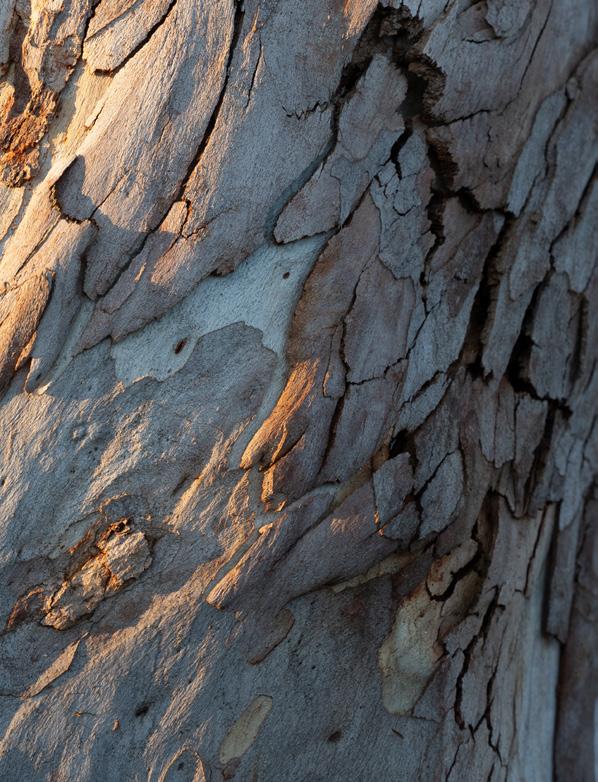
We ought never to do for young people what they, with a struggle, can be expected to be doing for themselves.”
Michael Norman, Woodleigh Principal 1974–1980

Acknowledgement of Country
We acknowledge that we work, play and learn on the land of the Boon Wurrung and Bunurong People, the traditional landowners of this area.
We pay our respects to Elders past and present, recognising that, like us, they have taught and continue to teach and share their knowledge and ideas in the hope of giving children a fulfilling and rich life.
First Peoples’ perspectives are embedded in our educational program and are an important aspect of the way we engage with our environment. As we strive to help students build connections with the land, it is essential that we also offer them an opportunity to develop an understanding of our cultural heritage. www.woodleigh.vic.edu.au

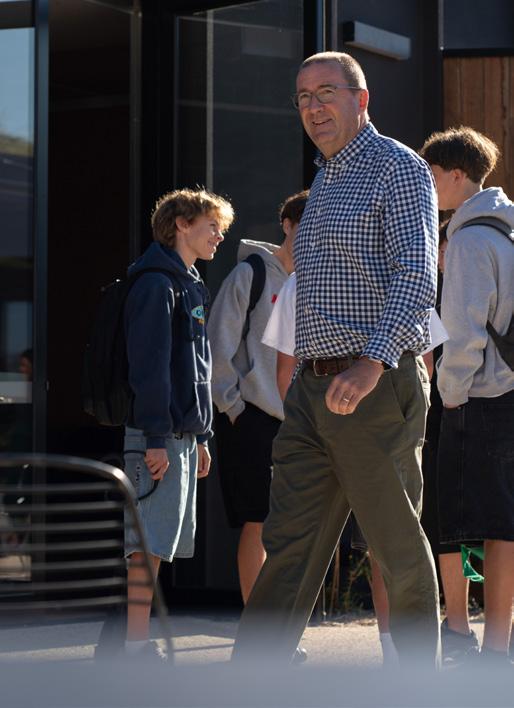
“At Woodleigh, we challenge our young people to be the best version of themselves.”
Welcome to Woodleigh
Woodleigh is a school born out of the desire to challenge the traditional concept of a ‘true education’.
Our Senior Campus was founded in the mid-70s, a time when education was viewed as a means of fulfilling the needs of an industrial-era workforce. Woodleigh questioned the status quo; it challenged conventional thinking, made courageous choices about how best to engage young minds, and pioneered the concept of holistic education.
Ours is a school where students sit at the centre of everything we do. We purposefully design learning where students directly experience the world they live in and develop strong relationships with each other, their teachers and members of our community. This focus on delivering experiential, transformative learning lends us to focus on nurturing the creativity, compassion, skillfulness and resilience of the young people in our care.
At Woodleigh, we challenge our young people to be the best version of themselves, and our students hold us to being the contemporary, creative school we proclaim ourselves to be.
Our 2030 strategic direction, Learning to Thrive, guides us toward the future. Our future continues to challenge the traditional notions of schooling and provides an education that delivers holistic growth and development for all students.
True to our ideal of being a home for ‘Adventurous Minds’, we aim to be a school that creates thinking opportunities through rich experiences to develop deep learning – learning which is real, challenging, creative, innovative and transformative.

David Baker, Principal
The School for Adventurous Minds
School may only be thirteen years of your life, but they are arguably the most influential. A time when you develop your identity, build your sense of self-worth, discover passions, navigate social dynamics and begin to understand your place in the world. The school where you ‘come of age’ is the foundation of the adult you become.
For this reason everything we do at Woodleigh is to create and foster Adventurous Minds, for the benefit of today and tomorrow.
As pioneers in holistic education, Woodleigh offers a unique balance of comprehensive and dynamic learning within an inclusive community. At Woodleigh, diversity is embraced and celebrated so everyone can thrive intellectually, emotionally and socially.
We work to create the highest quality school years possible, but, more than that –our philosophy is to set children up so they can find personal success in life and make a positive impact on our world.
Adventurous Minds can be intellectual and academic, but they are also curious, independent and creative problem solvers. Our curriculum complements strong academic rigour with experiential learning, extensive camp and Activity programs, community engagement and First Nations partnerships – developing wellrounded students with a bigger and more meaningful perspective on the world.
Woodleigh’s 3 Rs: Respect for Self, Respect for Others and Respect for the Environment, create a welcoming and progressive climate where students have the freedom to be themselves, where the concept of belonging is front and centre, recognising the fact that belonging is a core human need and the heart of our community.
Days in Woodleigh’s classrooms are just the beginning; our passion lies in educating students for the long term so that they become the independent, resilient, creative and compassionate individuals our world needs.
As educators it is critical that we keep one eye on the future, for our students and for our school – that’s why we are continuously researching and evolving, ensuring we are providing the strongest and most effective education for life.
Where other school’s endgame is a number, an ATAR, ours is a person. A skilful and engaged life-long learner, and a positive contributor to their community.

Adventurous Minds can be intellectual and academic, but they are also curious, independent and creative.”


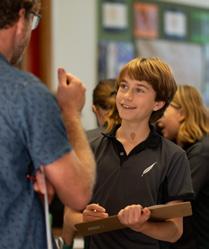
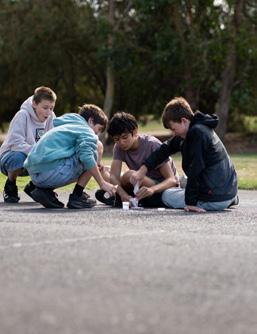
Historically Speaking
Woodleigh School opened its doors in 1856 as a small, independent, coeducational primary school known as St. Paul’s School.
St Paul’s was one of the earliest schools in the Colony of Victoria and is the oldest independent, co-educational school in Victoria.

The primary school was originally housed in a small wooden hall on the grounds of the Anglican Church on Frankston’s High Street. It played an important part in the early days of the 19th Century Victorian Colony –providing a focus for the small, rapidly growing community. Early settlers paid one shilling each week to have their children receive a ‘sound moral education’ to counter the effects of ‘larrikinism’ after the Gold Rush.
In 1970, the school moved to 3.5 hectares off Seaview Road in Frankston South. This primary campus was called Minimbah – an Aboriginal word meaning ‘place of learning’.


In the early seventies, a group of parents investigated the feasibility of establishing a secondary school. Michael Norman was appointed as its founding Principal and in 1975, the Senior Campus was opened on 12.5 hectares of bushland in Langwarrin South. This campus retained the name of the original farm property, “Woodleigh”.
From the beginning of 1999, the combined campuses became known as Woodleigh School.
By 2001, the area of the Senior Campus had increased to 22 hectares.
At Woodleigh, emphasis has been placed on preserving, maintaining and developing the native vegetation. Classrooms, specialist facilities and the multi-purpose environments we know as Homesteads are all set in the bush.
In 2015 Woodleigh School merged with Penbank School in Moorooduc, creating a second Junior Campus with an enrolment of just over 200 students. Our School now cares for just over 1000 students.
Three Unique Campuses. One Shared Vision.
The Woodleigh Journey
Woodleigh’s sequential and scaffolded curriculum means all students learn by experiencing the world they live in, delivering experiential and transformative learning that nurtures the well-rounded development of the young people in our care.

Early Childhood
Childhood is not a race. It is a journey filled with curiosity, wonder and boundless possibilities.
At Woodleigh, we hold firm in our belief that young people should not be hurried through these precious years, but instead be given the space to explore, play and grow in their own time. At Woodleigh’s Early Childhood Centres, children are at the heart of everything that happens: the teaching, the activities and the environment.
Staffed by expert and experienced professionals, both Minimbah and Penbank provide engaging learning environments where children make sense of the world around them through cooperative play, exploration and inquiry.
Childhood is sacred, a time of discovery and delight. As parents and educators, our role is to guide, nurture and support our students at all ages and stages. In Early Childhood, specifically, our role is to honour our children’s voices, to listen deeply and to provide opportunities for them to flourish.
Woodleigh’s Early Childhood Centres have been judged to be Exceeding the National Quality Standards by the Australian Children’s Education & Care Quality Authority (ACECQA).
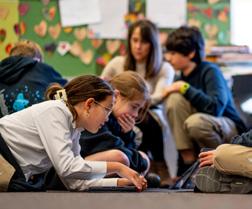
Primary
The Primary years at Woodleigh provide a learning environment where students are stimulated and challenged – where education can be a joy.
From a student’s first days at school, we educate them to be lifelong learners – scaffolding their development of skills and attributes to make them comfortable with taking responsible risks with their learning.
A focus on practical and participatory learning encourages students to develop the ability to make rational, informed decisions while building self-esteem and a broad awareness of what is happening in the world around them. This approach to education enables students to become more academically able, developing emotional intelligence, solid friendships and strong community links.
At Woodleigh, we embrace childhood in all its richness. We believe in the value of play, the joy of deep inquiry and the magic of storytelling. We see each child as a capable, competent and creative individual, celebrating their journey with patience and care. 8 Woodleigh School
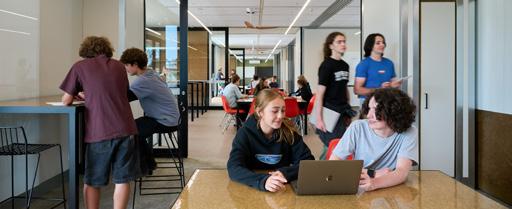
Secondary
Fifty years ago, our Senior Campus was born in response to an education system that didn’t serve its intended purpose.
Our founding Principal, Michael Norman, realised the critical development stage that are our teenage years. He built a school designed to offer real challenges and relevant experiences to an audience needing connection and guidance, and the room and opportunity for genuine growth in a shared culture of respect.
The positive staff-student relationships that exist at Woodleigh are the hallmarks of an environment where students tackle each day with an energetic approach to their learning. Our curriculum and programs are intentionally designed to support the significant cognitive development that occurs during adolescence, particularly in areas responsible for decisionmaking and emotional regulation. Nurturing these developing skills and providing a supportive environment where students can thrive academically and personally sees our students become more engaged and thoughtful, recognising that success is achieved through dedication, patience, and persistence.
Post School
The paths that Woodleigh graduates take after graduation are as varied and interesting as the individuals themselves.
Beyond our classroom curriculum, Woodleigh’s Careers Program enables students to clarify career aspirations, investigate tertiary and career options and develop job skills. Our project-based learning focus in the Middle Years and Regenerative Futures Programs encourages students to engage with outside industry.
Many students have also discovered interests, passions, strengths and vocational interests through the huge range of Activities and Activities Week Programs we offer, supporting their VCE subject choices and Tertiary pathways.
Careers Education is integrated into Woodleigh’s curriculum with a strong focus on interview skills, resumé building and work experience in Years 9 and 10. During VCE, our emphasis is on the selection of appropriate subjects in preparation for tertiary study or employment pathways.
Flipping the Funnel
There is something special about the way people respond to each other at Woodleigh. This is a place that affirms openness, independence, and initiative, elements you can sense as soon as you enter the school.
Here, we have faith in our young people – a positive expectation that, in most situations, good will emerge. Our school culture of mutual respect, where students are known, valued and mentored by staff encourages them to develop a healthy sense of self-worth, including an understanding of their own strengths and weaknesses. It is this environment that encourages students to enthusiastically and confidently engage in their learning.
In a sense, we have flipped the traditional ‘funnel’ model of education. We see the learner at the centre of their education, with their skills and experience expanding outward rather than narrowing in focus over time.
Instead of delivering standardised content in a linear fashion, Woodleigh begins by seeing each student as an individual with their own identity, interests, and relationships. This model encourages students to explore learning through real-world experiences, engaging them in a more holistic and personalised educational journey.
For some, the lack of a uniform at our Senior Campus is a bridge too far, an invitation to rebellion and disorder. For us, it is an acknowledgement that at its base level, the school uniform debate centres on control. The most effective way to curb independence and individuality and assert the authority of the adult is by uniform. We prefer to rejoice in the personal style of our Senior Campus students.
It’s our differences, after all, that make us so interesting.
“We see the learner at the centre of their education, with their skills and experience expanding outward rather than narrowing in focus over time.”
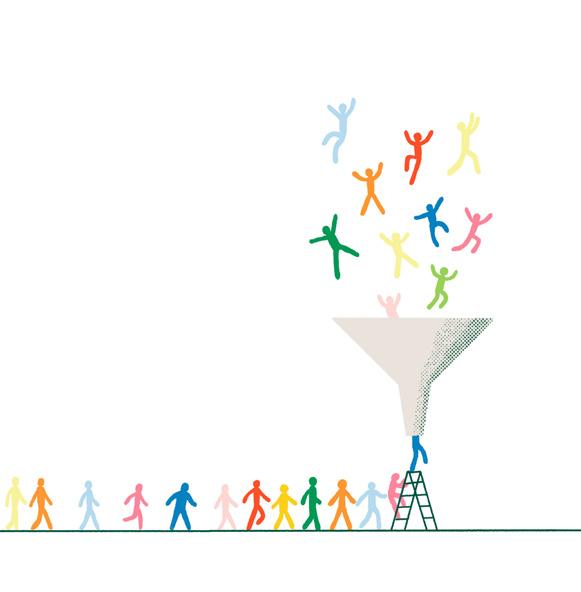



Why Co-ed?
Choosing the right school for your child can be challenging, and deciding between co-education and single-sex education is a significant factor for many families. As Victoria’s oldest co-educational independent school, Woodleigh is committed to the belief that this is the only suitable setting to educate children for adult life.
Since its inception, Woodleigh’s commitment to co-education has delivered our families a seamless educational journey from Early Childhood to Year 12. For generations, siblings and their parents have been part of our community, growing and developing together.
Real-world learning plays a crucial role in fostering inclusivity and social cohesion at Woodleigh. Co-education enhances
social skills, disempowering stereotypes and promoting equality. Exposure to diverse perspectives and experiences helps students develop empathy and effective communication skills. In a co-educational setting, students collaborate, share ideas and experiences and engage in respectful conversation and debate.
At Woodleigh, Respect for Others is a fundamental value that prepares students
for life beyond school. From Early Childhood, Woodleigh students grow with this understanding of respect, including concepts of consent and boundaries. This respect is reinforced daily in classrooms and playgrounds, activities and camps.
Woodleigh graduates move through the world with an easy confidence – the natural outcome of growing up in an inclusive, respectful environment. Woodleigh School 11
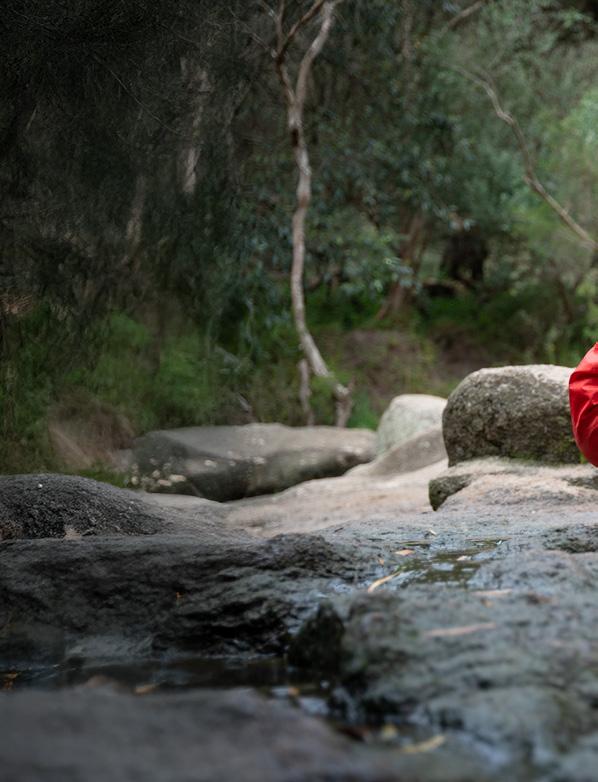
Our Vision
The purposeful development of creative, compassionate, skilful and resilient young people who thrive in an ever-changing world.
Our Values: The 3 Rs Respect for Self, Respect for Others and Respect for the Environment.
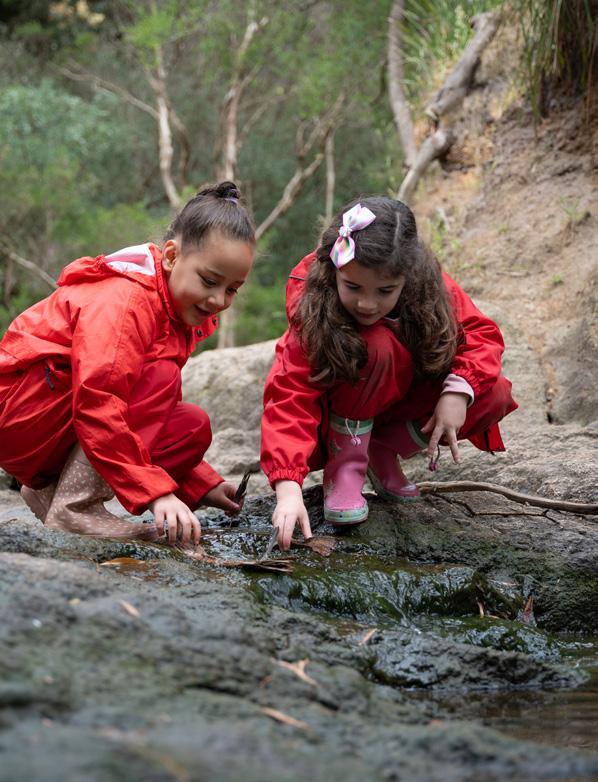
Students explore the local natural environment, making connections to their Unit of Inquiry
How We Learn
At Woodleigh, we believe that great education is more than just an excellent academic preparation for the future.

We know that the development of academic learning, personal wellbeing and student engagement are interdependent. Woodleigh students and staff do not exist in silos. Instead, we promote the collaborative development of student outcomes across the essential elements of learning:
• The understanding of concepts.
• The acquisition of knowledge
• The mastery of skills
• The development of productive attitudes
• The ability to perform meaningful tasks in real-world settings
We understand that such learning happens best in environments where students can take risks, question their assumptions, respond creatively and explore new ways of thinking. For this reason, student voice, choice and ownership are supported and mentored and programs are built around their specific interests as learners.
Our mission – to purposefully develop creative, compassionate, skilful and resilient young people who can thrive in an everchanging world – necessitates an engaging and responsive curriculum spanning Early Childhood to Year 12.

The International Baccalaureate (IB) Primary Years Programme (PYP) nurtures students’ development as active, curious and caring learners. From ECC to Year 6, it focuses on developing the whole child as an inquirer, encouraging children to explore and understand the world around them.
Inquiry-based learning empowers students to take ownership of their education by asking questions, conducting research and presenting their findings.

Structured Inquiry
Teacher poses a question and guides students through process of finding a solution
Controlled Inquiry
Teacher poses a question and describes the process, leaving students find a solution
Guided Inquiry
Teacher poses a question and students develop their own process for finding a solution


The IB Middle Years Programme (MYP) continues to develop students as learners by making practical connections between academics and the real world.
International-mindedness might seem a far-off concept here on the Mornington Peninsula. However, building an understanding and appreciation of cultural diversity necessitates that today’s students explore global issues, think beyond the safe confines of the Peninsula and consider their societal role on a more global scale.
The Year 10 Regenerative Futures Program (RFP) is designed to equip students with the skills and knowledge to navigate a complex, rapidly changing world. Students explore responses to some of their generation’s defining, social, environmental and economic challenges. By investigating these topics, students learn how their actions can positively impact the future.
The RFP is a space for deep thinking and presents a hopeful future, providing opportunities for students to explore regenerative practices that help heal and improve their world. The program builds on the knowledge and skills developed by the MYP and enhances students’ academic skillsets in preparation for VCE. The RFP curriculum includes core studies in English, Mathematics, Science and Humanities, as well as a broad range of elective subjects and opportunities for accelerated studies in VCE.
First Nations’ Perspectives
Aboriginal and Torres Strait Islander perspectives are embedded in our teaching and learning, recognising the history and teaching of one of the world’s richest and oldest continuing cultures. Enduring links with local and remote communities create two-way learning experiences that share culture at a grass-roots level.
Nurturing Digital Natives
STEAM (Science, Technology, Engineering, Art and Mathematics) education at Woodleigh is dynamic and hands-on, emphasising real-world applications. Junior Campus students can design, code and build simple machines, while at Senior Campus, students engage in more complex coding, data analysis and robotics projects. These activities not only enhance technical skills but encourage creativity, innovation and problem-solving.
Learning at Woodleigh promotes exploration, collaboration and reflection in authentic, real-world situations. When students are intellectually, emotionally, socially and physically engaged, learning becomes more authentic, personalised and relevant in the present and easier to apply to future experiences.
Avenues to Growth
Woodleigh’s IB curriculum prioritises the understanding of concepts over the memorising of facts. We aim to be a school that creates thinking opportunities that develop deep learning – learning by doing, learning which is real, challenging, innovative and transformative.


Holistic Assessment
No one can predict what today’s students will need to know in ten, or twenty years’ time. However, our capacity to be creative, solve problems and think analytically will not diminish. Woodleigh’s work with the New Metrics program at the University of Melbourne supports our focus on building complex competencies in our students. New Metrics refer to ways of assessing and measuring student performance and competencies beyond the tradition of standardised tests and exams.
They aim to measure and report on the broader skills and abilities crucial for success in today’s world – skills such as adaptability, collaboration, data literacy and emotional intelligence. The teaching of these skills is embedded in our practices from the earliest days of students’ educational journey through our PYP, MYP and RFP frameworks, with students of all ages exploring big ideas and connecting their academic studies with their social and emotional development in meaningful ways.

Learning from Mistakes
Learning from our mistakes is a strong educational philosophy that motivates students to interpret errors as opportunities rather than obstacles. At Woodleigh, we know sound education can only take place in an environment where students feel safe, valued and respected. It is this environment that allows students to take risks with their learning and exist at the edge of, or just beyond, their comfort zone, remaining motivated and seeking and responding to challenges.
The IB: A Flexible Framework for Learning
The International Baccalaureate Primary Years and Middle Years Programmes are all about creating connections. Connections between subjects and content, between teachers, students, campuses and year levels.
For our teachers, the PYP and MYP programmes promote collaboration across our three campuses. The IB learner profile uses common language, so from the moment they start in threeyear-old Early Childhood, Woodleigh students learn how to be open-minded, how to be risk-takers and how to be principled in their actions and balanced. That language – those concepts – are carried with them through to the Senior Campus.
The IB PYP and MYP programmes recognise that the real world

Environmental Care, Regeneration and Stewardship
An awareness of the land on which we learn and work encourages staff and students alike to deeply consider their impact on the planet. Environmental stewardship begins with genuine care for our surroundings, while the integration of environmental education into the curriculum, culminating in the Year 10 Regenerative Futures Program, develops citizens equipped to tackle the ecological challenges of the future.
doesn’t operate in isolated subject areas such as Maths, History or English, so rather than perpetuate this model, we produce curriculum and experiences that tackle complex problems with skills and knowledge from multiple disciplines. We view the world conceptually – we look at big ideas and our need to understand them is what motivates us to learn.
This flexible framework not only promotes a depth of learning but also higher-order thinking for students – stretching their understanding of the key knowledge they’re engaging with and addressing the elements of education we have always thought are important at Woodleigh.
Learn more about the International Baccalaureate at www.ibo.org
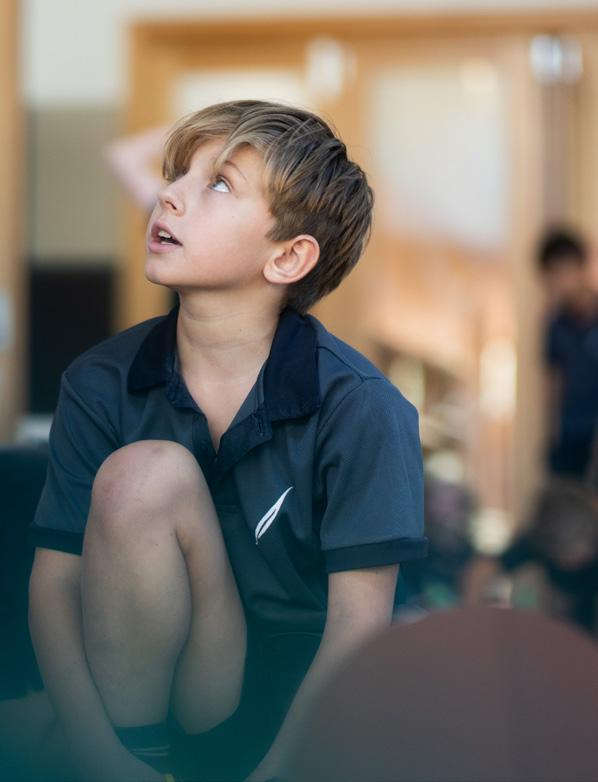
Learning to Thrive
Learning to Thrive is Woodleigh School’s strategic direction for 2022 to 2030.
A comprehensive plan to foster holistic growth and development for our school and students, the strategic direction emphasises experiential, real-world learning, placing students at the centre of their education. It supports the learning of young people who can apply their knowledge to solve real-world challenges and make a positive difference in the lives of others. Facilitating this involves creating opportunities for students to engage deeply with their learning, educating students’ minds, hearts and hands through authentic experiences, strong relationships and the promotion of intellectual, emotional, social, and physical engagement.
Learning to Thrive is built around three interconnected levels of student development: the inner, social, and outer worlds (see Wellbeing on page 28 for more details). This future-focused plan promotes exploration, collaboration and reflection in authentic contexts. It was informed by the needs of Woodleigh’s students and community, recognising that when students are intellectually, emotionally, socially and physically engaged, learning becomes more authentic, personalised and relevant for their current and future experiences.
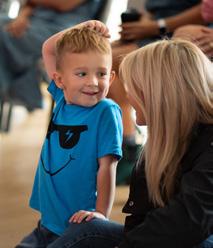

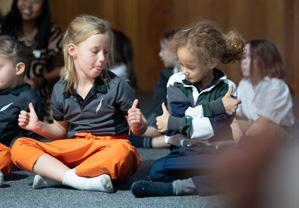
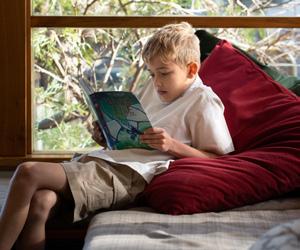
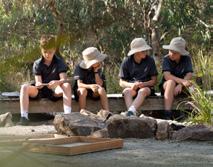
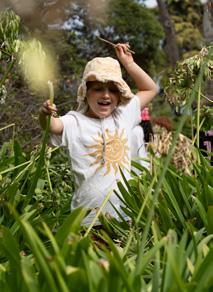
Early Childhood & the Primary Years
Our Early Childhood and Primary Years’ curriculum is carefully planned to promote the development of the whole child. Through experiential PYP learning programs, students connect with learning that is meaningful and relevant to their lives.
Both Junior Campuses operate purpose-built Early Childhood Centres (ECC), catering to three and four-year-old children. They are staffed by expert professionals whose work is influenced by the Reggio Emilia approach and the pioneering work of the Scandinavian Forest Schools. Inquiry and play-based learning, Art, Music, STEAM and Physical Education programs are features of the curriculum and range far beyond those of most Early Learning environments.
The Reggio Emilia approach, which is central to the ECC, encourages children to explore their interests and express themselves through various forms of play and creative activities. This student-centred approach values the child’s sense of agency and self-worth, fostering a love for learning from an early age.
The gradual development of life skills through the Outdoor Education program is essential to growing up at Woodleigh. Beginning in Early Childhood, students spend one day a week outside, exploring, unearthing and interacting with their natural environment. Seeing students take pride in their achievements, having overcome set or stumbledupon challenges – the conquering of a tree climb, the traversing of a rock gap – is brilliant. Leaders appear, supporting and organising fellow students. Turns are taken and problems are identified, discussed and ultimately, solved. Social, spatial, skills in judgement – the educational benefits are many, varied and, importantly, interwoven.
The Early Years Learning Framework (EYLF) underpins the ECC programs. The EYLF emphasises the importance of belonging, being and becoming, guiding children to develop a strong sense of identity and connection to their community.
As children move through the Primary Years at Woodleigh, they continue to benefit from academic programs designed to develop confident, literate and numerate problem-solvers who develop the skills,
concepts and understandings to support them as active, capable and mindful global citizens.
The curriculum includes explicit instruction in core subjects such as English and Maths, where phonics tuition ensures students develop strong foundational literacy skills. Mathematics is taught through engaging, hands-on activities promoting critical thinking and problem-solving abilities.
In addition to the core subjects, Woodleigh offers a full range of specialist programs, including Visual and Performing Arts, Health and Physical Education, Library and Indonesian Language Acquisition programs. Reading for pleasure, and the establishment of lifelong reading habits are a feature of the Library program.
Further involvement in programs such as Kitchen Garden involve students in growing, harvesting and preparing food, teaching valuable lessons about sustainability and nutrition. The hands-on nature of the Kitchen Garden program offers a sense of ownership and responsibility, and a connection to the environment.
A unique aspect of Woodleigh’s Junior Campuses is the transition to Homestead in Year 5. In Homestead, Year 5 and 6 students are guided and encouraged to develop skills that allow them to monitor, manage and direct their personal learning. Through the refinement of these skills and with the attainment of this knowledge, students will be able to transfer this learning to all other aspects of their future lives.
This transition marks a significant milestone in the students’ educational journey, serving as a bridge between the Junior and Senior Campuses. The Homestead program promotes greater independence and responsibility, preparing students for the more rigorous academic and social demands of Senior Campus.
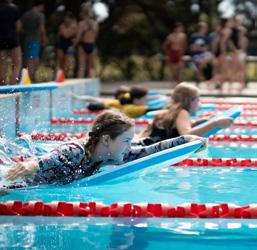

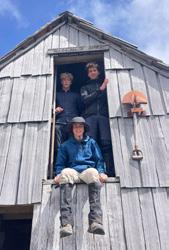
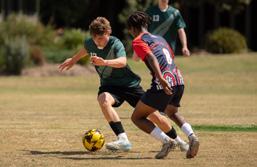
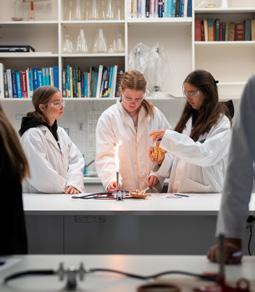

The Secondary Years
The educational experience at Senior Campus supports the academic, personal, and social development of students through a variety of innovative programs and a rich curriculum.
From Years 7 to 9, the Homestead Program builds on the Homestead experience at Minimbah and Penbank, underpinning Woodleigh’s approach to education. As students complete the Middle Years Programme (MYP), Homestead builds belonging and community on campus. Each Homestead is a ‘home away from home’, where students are known and valued.
In Year 10, students move to the Futures Studio, spending 12 months studying the Regenerative Futures Program (RFP). The RFP emphasises student agency, real-world learning, critical thinking and problemsolving. A perfect springboard to VCE study, high expectations are set for students to produce their best work, as they engage deeply with a thesis-style project of their own design.
In Years 11 and 12, students move into the Senior Homestead, where the program focuses on increasing leadership, responsibility, academic mastery and independence. A full range of VCE units, together with vocational (VET) subjects, school-based apprenticeships and accelerated University studies are offered to meet individual student needs.
Through the MYP years, rigorous academic studies in Mathematics, Language & Literature, Humanities and Science, deliver strong foundational skills. Language Acquisition, key to the IB curriculum, sees students choosing to learn French or Indonesian from Year 7. The Humanities program includes immersive History, Geography, Legal and Commerce studies, providing students with a deep understanding of the social, economic and political systems that guide and govern our world.
Woodleigh is widely renowned for the strength of its Drama, Art, Design and Music programs. A core feature of the junior-secondary curriculum, our commitment recognises that self-expression through the Visual and Performing Arts enhances our understanding of ourselves and others as individuals. Music groups are many and varied, including orchestras, choirs, small and large ensembles and a thriving band scene.
Woodleigh’s Activities Program offers students a wide range of opportunities to try new things and make new connections with like-minded students. It is place where new interests are found, and passions develop. Choice and agency are central to the Activities model, enriching students’ school experience outside the traditional classroom setting.
As a member of the SIS sporting organisation, Woodleigh students compete in a wide range of traditional team sports. Involvement is noncompulsory and games takes place during the school day. Homestead Sports promote healthy Swimming, Athletics and Cross-Country rivalries and SIS Athletics, Swimming and Cross-Country competitions allow elite student-athletes to represent the school at higher levels. The Woodleigh Gymnasium, multicourts and Cruden Oval are our home grounds, with PE, Health and Sport making use of the spaces.
We don’t have Saturday sport, leaving weekends free for students to play in local community teams. Woodleigh teams play in the FDNA (netball) and FDBA (basketball) competitions outside school hours.
Woodleigh’s Round Square membership enriches student’s experience with opportunities to participate in local and international exchanges, conferences, and service projects. The Round Square IDEALS of Internationalism, Democracy, Environmental stewardship, Adventure, Leadership and Service align with our aim to challenge our students every day. The Woodleigh notion of ‘no growth without struggle’ leads us to naturally embrace Round Square founder, Kurt Hahn’s philosophy that our richest learning takes place at the edge of one’s comfort zone. Learn more about Round Square at www.roundsquare.org
The elective Broadening Horizons program offers cultural exchanges and service experiences. Woodleigh’s partnership with Chumkriel Language School (CLS) in Kampot, Cambodia is one such program. Year 10 and 11 students travel to Cambodia to work alongside CLS teachers, developing first-hand a sense of global citizenship and social responsibility.
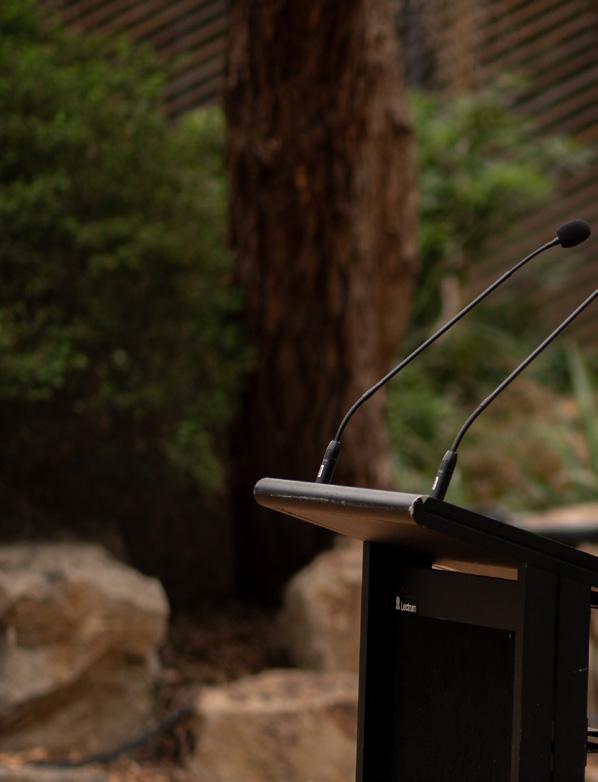
Our education is formed in the relationships we foster, the avenues we discover and the moments we find to reflect, respond and rediscover what’s important to us. In VCE, that’s hard. Between busy SAC weeks and exam preparation. There’s barely time to take a breath. But what I love about Woodleigh is that it gives us time to breathe.”
Ava Drayton-Benson, 2024 Dux (99.25 ATAR)
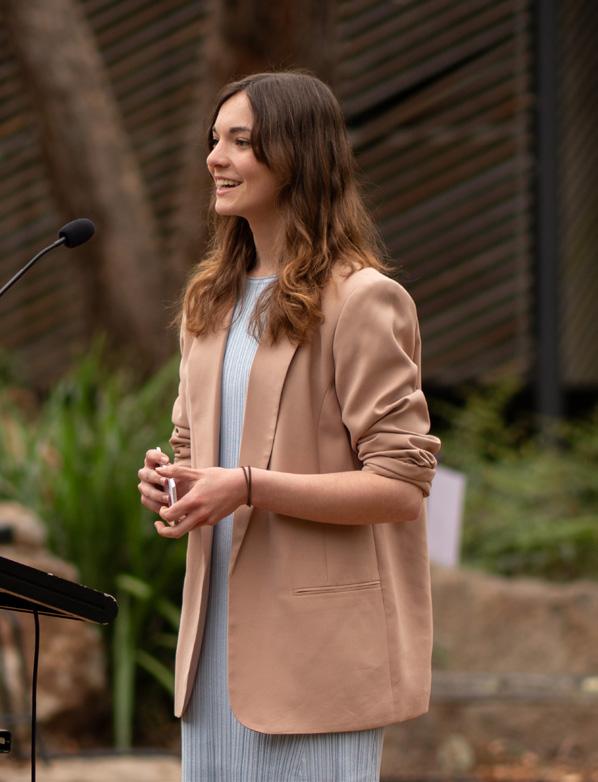
School Life
Visitors often comment on the positive activity and sense of purpose that characterises the oncampus dynamic at Woodleigh.
This is a fun, interesting place to spend your student days. Never boring, our school calendar is filled with events and activities that bring new experiences and interests to our entire community of students, staff, parents and friends.
Student voice is valued and warranted through the Senior Campus Woodleigh Committee, a student-led body actively involved in improving campus life.
Events such as our regular whole-school assemblies and service and fundraising programs are proposed, organised and run by this group, which includes members from Years 7 to 12.
Minimbah and Penbank Assemblies and School Meetings provide a platform for students and staff to unite, share achievements and discuss important issues with parents and peers. Junior Campus celebrations such as Penbank’s Harmony Picnic bring all campuses together to celebrate cultural diversity and unity. Students share the stage with professional performers, bringing international music, dance and food together in a broad celebration of our multicultural society.
The Minimbah Fair is organised by the campus Parents and Friends Group (PFG). A celebration of student bands, stalls, games and delicious food, this biennial event represents the best of Woodleigh’s community spirit.
The annual Arts Festival, held each October, highlights the school’s Arts culture, bringing professional performers and visual artists to Woodleigh while celebrating the artistic talents of our students. Throughout the week-long festival, Senior Campus comes alive, featuring an exhibition of Year 12 work in the Dame Elisabeth Murdoch Gallery, workshops, music, drama and comedy performances and the school’s annual Film Festival.
Throughout the year, music concerts and ‘Musicales’ fill our halls with instrumental, vocal and band performances by our talented musicians. At Senior Campus, the staff of our Jago Centre for Performing Arts continue to up the ante, pushing students to new levels of professionalism with each performance. School Productions switch between musicals and plays on a year on, year off basis, with students involved in all on and off-stage roles.




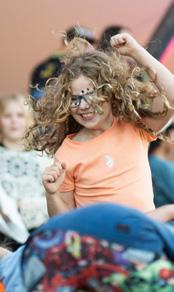


Senior Assembly Harmony Picnic
Junior Production
Arts Festival at Senior Campus
Minimbah Fair
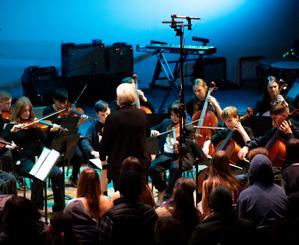



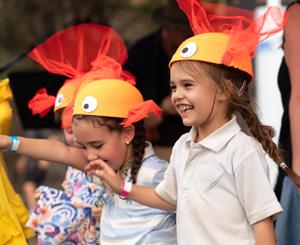
Community
As school communities become larger, they risk becoming institutions where individuals are less easily seen, a sense of belonging is lost and management needs to become more formal. Woodleigh has been intentionally kept moderate in size, remaining personal and flexible. By cultivating strong relationships with parents, alumni and the broader educational community, Woodleigh creates a supportive and dynamic environment where students thrive.
Families
We know a strong partnership between the school and families is essential for student success. Parents are actively involved in school life through various events, volunteer opportunities and regular communication with teachers and staff. This collaboration ensures students receive consistent support, understanding and timely feedback at home and school.
Alumni
Our alumni community is an integral part of Woodleigh’s extended family. Graduates stay connected through reunions, networking events and mentoring programs, often returning to share experiences and insights with current students, providing valuable career guidance and inspiration. This ongoing relationship helps maintain a strong sense of community and continuity across generations.
Parents and Friends
Woodleigh’s Parents and Friends Groups (PFG) enhance the schooling experience for students and families at each campus. Parents who volunteer for our PFGs support events and celebrations, fundraisers and social gatherings, bringing life and a sense of belonging to the school. Their efforts support various school initiatives and projects, injecting a sense of fun and enriching our school culture.
Educational Community
Woodleigh maintains connections to the broader teaching and education community through the Woodleigh Institute and ReimaginED conference. These initiatives link us with MIT, the Melbourne University Graduate School of Education and the international New Metrics Program, promoting innovative teaching practices and maintaining Woodleigh’s position at the forefront of educational excellence. Exposure to global thought leaders in education and sharing in the insights and advancements gained through these connections directly benefit our students, ensuring they receive the highest-quality, most future-focused education possible.
Musicale
Perberkoong
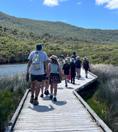


Camps & Experiences
Camps are a cornerstone of the Woodleigh journey –immersive, hands-on experiences that build independence, resilience and close links between students and staff.
As students progress through their primary and early secondary years, the Camps Program grows with them, helping develop essential life skills such as cooking, planning and problem-solving. More than just camps – these experiences offer opportunities to grow, lead and connect with others and the environment in meaningful ways.
Every camp is a step in a carefully designed progression, preparing students for greater challenges as they move towards the Year 9 Outward Bound Program and the iconic Year 10 Hattah Expedition.
All of our camps encompass Woodleigh’s core values: Respect for Self, Respect for Others and Respect for the Environment. Our goal is to create young people who are confident, resilient and able to undertake their own adventurous journeys.
Primary Camps
Sleepover (Year 2)
A gentle introduction to the Camps Program, the sleepover provides a fun overnight experience at school that supports students to build their confidence and independence.
Adventure Camp (Years 3-4)
Students venture to a variety of locations, marking their first proper camp experience and introducing them to adventure activities and responsible risk taking.
Cultural Camp (Years 3-4)
During Cultural Camp, students immerse themselves in diverse cultural experiences, building links to their IB Unit of Inquiry while broadening their understanding and appreciation of different traditions.
Wilsons Prom (Year 5)
Students explore the natural beauty of Wilsons Promontory, engaging in outdoor activities such as surfing and hiking that enhance their environmental awareness and teamwork skills.
Sovereign Hill (Year 5)
Students step back in time to experience life during Australia’s gold rush, gaining historical insights and linking to their unit of enquiry through experiential learning.
Canberra (Year 6)
Students get a firsthand look at Australia’s capital, developing their understanding of governance, history and civics through visits to significant political and cultural landmarks.

Wugubank (Year 6)
Penbank students head to Wugularr School in the remote community of Beswick in the Northern Territory, where they participate in activities that promote an understanding of First Nation’s culture.
Green
Camp Bali (Year 6)
Minimbah students attend Green Camp in Bali, focusing on sustainability, global awareness and environmental stewardship through hands-on projects.

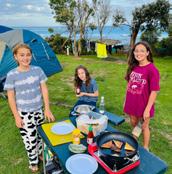



Secondary Camps
Homestead Camp (Years 7-8)
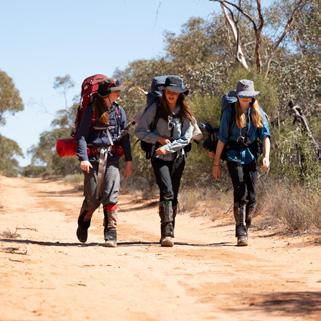
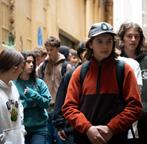

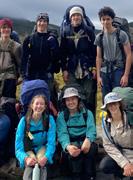
Outward Bound
(Year 9)
Hattah
(Year 10)
Homestead Camps explore coastal environments and are designed to develop social connections within the Homestead for new students while the Year 8s step up to act as leaders.
Activities
Week (Years 7-11)
Activities Week sees students ballot for a variety of engaging experiences, from outdoor challenges to creative workshops, excercising agency over their learning while building personal growth and teamwork.
Baw
Baw (Year 8)
Students complete an overnight hike at Mt Baw Baw, building resilience and developing skills in preparation for Outward Bound.
The Outward Bound program pushes students out of their comfort zones with a challenging outdoor expedition in Victoria’s Snowy River region that builds confidence, independence and self-reliance.
City Bound
(Year 9)
City Bound immerses students in Melbourne’s urban environment, where they navigate city life and engage in community groups and research projects.
The
Regenerative Retreat (Year 10)
Students attend The Regenerative Retreat, where the program introduces students to regenerative thinking across a number of scenarios and focuses on developing community in the Futures Studio.
A transformative rite of passage, Hattah sees students navigate and explore HattahKulkyne National Park, in small groups with limited staff intervention. Alumni often reflect that this experience that taught them that they could handle any challenge.
Broadening Horizons
(Years 10-11)
Broadening Horizons camps offer diverse experiences designed to expand students’ perspectives and worldview.
Senior Homestead Camps (Years 11-12)
As they approach adulthood, Year 11 and 12 students have the opportunity to choose an area of passion and explore outdoors, arts and cultural learning opportunities, building lasting memories with peers.
Milestones and Rites of Passage
Woodleigh’s focus on a lived education means that as students grow, a series of significant milestones help shape their education and personal growth. Each Rite of Passage marks a unique and transformative moment, building confidence and skills and celebrating students’ achievement.
ECC
Joining the ECC
Our youngest students join us to explore, play and grow, making sense of the world around them.

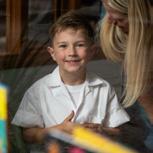
Foundation
Starting school
The Primary Years begin with a focus on inquiry and the attainment of foundational skills. Our broad, involving curriculum is led and supported by dedicated teachers
Year 5
Joining the Homestead
Students become part of the close-knit Homestead Community, building strong friendship bonds and a sense of belonging and responsibility.

Year 6
Exhibition & Graduation
Students showcase their achievements through the PYP exhibition, celebrating their learning and preparing for their transition to Senior Campus

ECC4
Woodleigh’s Outdoor Education Program begins with Nature Kinder.
Year 3
Away from home! Students go on their first multi-night adventure camp.
Year 10
Independence, trust and adventure. The Hattah expedition is the culmination of Woodleigh’s compulsory Outdoor Education Program.
Year 9
Outward Bound, City Bound and the MYP Community Project
Through service and collaboration, students work to meaningfully impact their communities, demonstrating their commitment to global citizenship.
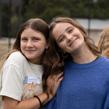
Year 7
Transitioning to Senior Campus
New challenges abound as students are supported through their transition to secondary education, embracing opportunities and new subjects with a keen curiosity.
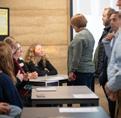

Year 10
Year 11 Joining Senior Homestead
New physical spaces pair with new challenges in these final years of schooling – eyes on the future and dedicated.

Futures Studio and Regenerative Futures Program
A space for deep thinking, students build on the knowledge and skills developed by the MYP while exploring regenerative practices that help heal and improve their world.

Year 12
Finishing School
Reflection, celebration and anticipation. After years of hard work and focus, we mark the end of one chapter and the beginning of new adventures.
Year 8
Second time on Homestead Camp and it’s the Year 8s’ turn to lead. They also work with Year 6 students at Minimbah and Penbank in preparation for their entry to Senior Campus the following year.
Wellbeing
Woodleigh’s emphasis on the development of ‘good humans’ is deeply integrated into the fabric of our community.
At Woodleigh, we have long employed the concept of Systemic Wellbeing, where all parts of our school are leveraged to support individual and collective thriving. One element, the physical design of our campuses, is deliberately different from the norm. Here, there are no hectic corridors and locker bays to navigate. Instead, students move through the natural bush setting as they transition between classrooms, Homesteads and specialist learning spaces.
Collectively, components like our learning environments, Homestead structure and supportive teacher-student relationships promote the development of compassionate, creative and resilient young people.
Woodleigh prioritises the development of self-awareness, emotional intelligence and connection, equipping students to thrive both within and beyond school boundaries. The emphasis on holistic, systematic and values-aligned approaches to wellbeing ensures students are not only academically prepared but also emotionally and socially resilient, ready to make a positive impact on the world around them.
By integrating Compassionate Systems Thinking, regular self-awareness practices, and a strong sense of community, Woodleigh creates an environment where all students can thrive. Central to this is the practice of regular check-ins, which foster self-awareness and encourage students to ‘show up’ authentically. Educators draw on a suite of tools and practices that allow for the effective embedding of wellbeing throughout the
curriculum. These practices cultivate a ‘generative social field’, where being intentionally present leads to clarity and kindness within the community. By becoming aware of their emotions and understanding them, students are better equipped to make thoughtful choices about their actions and interactions and engage with the world’s complexity without being overwhelmed.
In pursuit of this, Woodleigh greatly values being at the forefront of educational research and practice. To inform and support the embedding of these practices, Woodleigh partners with The Centre for Systems Awareness at the Massachusetts Institute of Technology, (MIT). This partnership provides the tools, practices and research to ensure that wellbeing is not just a standalone program but an integral part of the school’s culture, operations and learning experiences.
Nurturing both inner and outer wellbeing is crucial for the development of thriving indivduals and communities, and Learning to Thrive, the school’s 2022-2030 strategy document, emphasises the importance of nurturing students’ Inner, Social and Outer Worlds. The Inner World focuses on personal growth, self-awareness, and the pursuit of personal goals. The Outer World encourages students to engage with complex social and environmental challenges, applying critical and creative thinking to real-world problems, while the Social World emphasises interpersonal development, effective communication, and positive relationships.
Woodleigh’s 3 Rs and our focus on mutual respect sets us apart
Inner World
Social World Outer World
David Baker, Principal “
Wellbeing isn’t something that happens after lunch on Tuesdays. It’s woven into the fabric of everything we do at our school.”
Inclusion
Woodleigh’s Learning Enhancement (LE) Team works with students across all year levels and campuses to ensure that all students’ unique learning requirements are addressed.
Partnering with classroom teachers, families and allied health professionals, we develop, implement and review Individual Learning Plans (ILPs) for students who are neurodiverse, have specific learning difficulties, or require learning extension. The LE Team works closely with the Counselling and Wellbeing Team to support students where necessary.
What Learning Enhancement looks like
from many schools. Simple things, like honouring students’ pronouns and name preferences, create safe spaces, while visible support for LGBTQIA+ students and families can be seen at all campuses. Respect sits at the very core of Woodleigh, and this includes celebrating the diversity in the community for the benefit of all.
Central to the development and maintenance of positive and respectful relationships at Woodleigh is restorative practices. Restorative practices view positive relationships as central to learning, growth and a healthy school for students and adults. The tools and approaches that make up these practices are employed in situations where relationships have been damaged. They include restorative conferences and conversations, acknowledging the impact of our choices and the steps required to ‘put things right’ when a student’s choices cause harm. By focusing on repairing harm and restoring relationships, these practices promote a sense of community and mutual respect, whilst applying relevant consequences for the choices made.
At Woodleigh, child safety is our highest priority. The school adheres strictly to child protection and safety policies, ensuring that all reporting and disclosure obligations, including mandatory reporting, are met. Child Safety Officers across all campuses take an active leadership role in promoting a Safeguarding Culture, educating staff and students on protective factors and equipping them with the tools to be champions of safety and respect in the Woodleigh and wider community.
Junior Campus students with a diagnosed learning difficulty or disability where there is a functional impact on their learning may be supported by Learning Enhancement teachers and assistants. Our inclusion model employs a hybrid mix of specific withdrawal programs and in-class support targeting specific learning needs. Specialist Learning Enhancement Teachers support classroom teachers in planning differentiated classroom programs, ensuring scaffolds are in place for identified students. Students needing extension also engage in programs and activities to support and extend their skills and interests. Differentiation is managed in class, following student’s ILPs, with an accelerated Mathematics stream offered at the Senior Campus. Significant opportunities and scope for acceleration exist within the IB, Activities and broader co-curricular programs, with Debating and Da Vinci Decathlon challenging and stimulating students’ minds.
At Senior Campus, students with a formally diagnosed learning difficulty that has a functional impact on their learning may elect to enrol in a Learning Enhancement class. These smaller classes replace a language study* (French or Indonesian). In these classes, which run from Years 7 to 10, teachers focus on enhancing literacy and numeracy skills and provide general academic and curriculum support. LE classes offer students additional time to complete class and homework tasks from their other subjects in a supportive, structured environment. LE classes also focus on developing the MYP Approaches to Learning (ATL), which are skills designed to enable students in the IB Middle Years Programme (MYP) to “learn how to learn.”
* Students who enrol in a Learning Enhancement class cannot move back into a language study later.
Campuses & Facilities
Woodleigh’s campus environment is a long way from the concrete and corridors that characterise most other schools. Our day is not dominated by electronic bells and loudspeaker announcements. We are a calm school.
Care has been taken to ensure that our classrooms and buildings do not overwhelm the nature that surrounds us, a character unique and special to Woodleigh. A quick dash through the rain between lessons connects students to their environment in ways that being cooped up indoors all day cannot.
Our Junior Campuses, Minimbah in Frankston South and Penbank in Moorooduc, feature dedicated Early Childhood Centres, classrooms and a full complement of specialist facilities, including gymnasium, music classroom and tutorial spaces, oval, hall, library and art rooms. 5/6 Homesteads support specialised science, technology, podcasting and film production lessons. Adventure playgrounds dot the grounds. Twenty-two hectares of remnant and re-established Langwarrin South bushland make up our Senior Campus, with Homesteads and specialist facilities placed thoughtfully across the campus.
Our Hall hosts school productions and musical performances. The Jago Centre
for Performing Arts features performance and tutorial spaces, band rooms, dance, drama and film studios. The Dame Elisabeth Murdoch Gallery is the centre of the school’s visual arts facilities, which include computer-aided design, STEAM and product design studios.
Our Science Centre includes dedicated chemistry, physics and biology classrooms. Library, careers, the Woodleigh Farm and Brian Henderson Reserve, multipurpose sports courts, oval and gymnasium complete our specialist facilities, while the five Junior Homesteads, Year 10 Futures Studio and the Senior Homestead house the bulk of our classroom, exam and shared social spaces.
Since the opening of the Senior Campus in 1975, our development focus has been on creating spaces that support the learning of our students in a lived and practical sense. Or, as Michael Norman wrote in his book, ‘Woodleigh’, “We wanted buildings that could be used and changed and developed as flexible and responsive learning environments.”
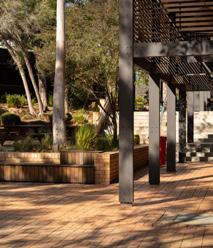
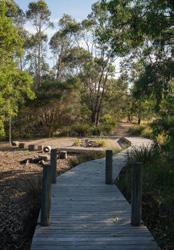

The Courtyard at Minimbah
Melbourne
Flinders
Portsea Rye
Dandenong
Frankston
Our campuses are approximately a ten minute drive from one another and 40 minutes drive from the Melbourne CBD. Extensive bus networks serve our campuses.
Minimbah Frankston South Penbank Moorooduc Senior Campus Langwarrin South
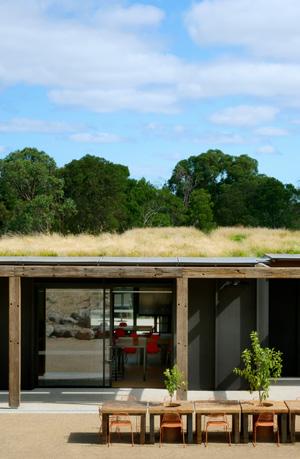
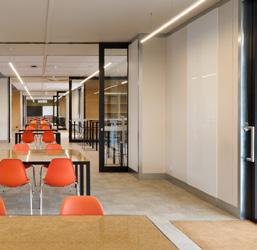
“The natural bush environment has been disturbed as little as possible – Woodleigh is virtually invisible from the road.”
Excerpt from Woodleigh – An Alternative Design for Secondary Schooling, 1982
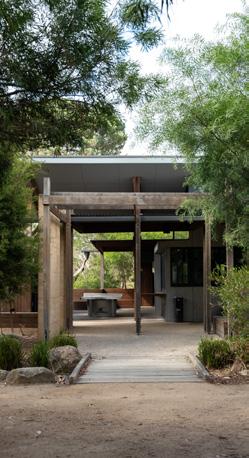
Michael Norman, Woodleigh Principal 1974–1980
Homestead
2 at Senior Campus
The green roof of the Futures Studio
Scan to take a virtual tour of our campuses Woodleigh
Start your Woodleigh Journey
We welcome families to come and see what makes our school so unique through events and tours that give you a feel for our community and learning spaces.

Information Evenings
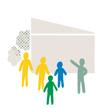
Campus Tours

Open House
Presented by our Principal, David Baker, Enrolment Information Evenings provide a comprehensive insight into the philosophy and practical approach behind Woodleigh’s educational framework, from Early Childhood through to VCE.
Learn more about Woodleigh on a tour at one of our three campuses. A member of our Enrolments Team will show you around the grounds and our student guides will give you a glimpse into daily life at Woodleigh at a time that suits your family.
Book your attendance for an Information Evening, Campus Tour or Open House at www.woodleigh.vic.edu.au/enrol/visit-woodleigh
Contact us
Call our Enrolments team on (03) 5971 6100 or email enrol@woodleigh.vic.edu.au
Visit www.woodleigh.vic.edu.au to learn more about our school, or find us on Facebook, Instagram and YouTube
Enrol now
Our Open House events let busy families explore our Junior and Senior Campuses outside school hours. Grab a coffee or tea and chat with our Enrolments Team and school leaders as you explore our learning spaces and grounds.
Woodleigh’s enrolment applications are ordered by date, with priority given to current families, children of past students and staff – so it makes sense to enrol your child as early as possible! Our online enrolment form takes about 30 minutes to complete and our Enrolments Team is always available to answer any questions.
Visit enrol.woodleigh.vic.edu.au/application-for-enrolment or scan the QR code to start your enrolment.
Woodleigh is a school that both inspires and supports. But Woodleigh never forced me into anything.
Woodleigh taught me that you can’t simply wait to be given things in life. You have to earn them. You have to work for them. You have to go out on a limb and be creative.
Most importantly, Woodleigh has inspired a culture of giving and supported wellrounded growth within us all.”
Sam Saunders, past Woodleigh student and co-winner of the Woodleigh Prize. Inaugural Tuckwell Scholar (99.5 ATAR)



